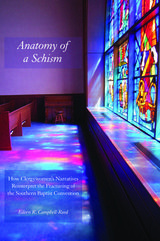
From 1979 to 2000, the Southern Baptist Convention (SBC) was mired in conflict, with the biblicist and autonomist parties fighting openly for control. This highly polarizing struggle ended in a schism that created major changes within the SBC and also resulted in the formation of several new Baptist groups. Discussions of the schism, academic and otherwise, generally ignore the church’s clergywomen for the roles they played and the contributions they made to the fracturing of the largest Protestant group in the United States. Ordained women are typically treated as a contentious issue between the parties. Only recently are scholars beginning to take seriously these women’s contributions and interpretations as active participants in the struggle.
Anatomy of a Schism is the first book on the Southern Baptist split to place ordained women’s narratives at the center of interpretation. Author Eileen Campbell-Reed brings her unique perspective as a pastoral theologian in conducting qualitative interviews with five Baptist clergywomen and allowing their narratives to focus attention on both psychological and theological issues of the split. The stories she uncovers offer a compelling new structure for understanding the path of Southern Baptists at the close of the twentieth century. The narratives of Anna, Martha, Joanna, Rebecca, and Chloe reframe the story of Southern Baptists and reinterpret the rupture and realignment in broad and significant ways. Together they offer an understanding of the schism from three interdisciplinary perspectives—gendered, psychological, and theological—not previously available together. In conversation with other historical events and documents, the women’s narratives collaborate to provide specific perspectives with universal implications for understanding changes in Baptist life over the last four decades.
The schism’s outcomes held profound consequences for Baptist individuals and communities. Anatomy of Schism is an illuminating ethnographic and qualitative study sure to be indispensable to scholars of theology, history, and women’s studies alike.
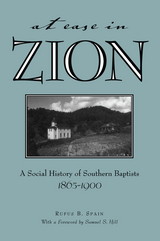
First published in 1967, Rufus Spain’s thorough investigation into Southern Baptist attitudes set the stage for research on religion in the American South. In At Ease in Zion, Spain questions the titular “ease” with society that Southern Baptists seemed to maintain following the Civil War. His analysis of denominational newspapers, as well as reports from the Southern Baptist Convention and state conventions, paint a compelling picture of the subjects’ complacency with their social existence, even as they criticized personal and recreational ethics.
While the South faced significant social, economic, and political changes after the Civil War, religion remained the primary moral influence. As the Southern Baptist denomination made up a significant majority of the population at that time, its leaders and attitudes had a clear and undeniable impact on social norms. Rufus Spain was one of the first writers to actively demonstrate the relationship between Southern religion and Southern society, and his work displays meticulous attention to the ways in which we are affected by complacency. He asserts that Southern Baptists viewed the American South as a version of God’s ideal society; any issues they wished to address were caused by individuals (such as those who did not conform to societal norms) or external attitudes (such as those in differing religions or regions).
At Ease in Zion is a critical part of the scholarly discussion on religion in society. Spain’s research offers a bold analysis of the American South and its citizens during one of the most tumultuous times in its history while providing a basis for arguments on “social Christianity” and its ever-shifting role in the world.

Since 1979 Southern Baptists have been noisily struggling to agree on symbols, beliefs, and practices as they attempt to make sense of their changing social world. Nancy Ammerman has carefully documented their struggle. She tells the story of the Baptist reversal from a moderate to a fundamentalist outlook and speculates on the future of the denomination.
Ammerman places change among the Southern Baptists in the context of the cultural and economic changes that have transformed the South from its rural past into an urbanizing, culturally diverse region. Not only did the South change; Southern Baptists did as well. Reflecting this diversity, the Southern Baptist bureaucracy was relatively progressive. During the 1960s and 1970s, moderate sentiments prevailed, while fundamentalists remained on the margins. These two were, however, becoming increasingly divergent in what they considered important about being a Baptist, in their views about the Bible, in their attitudes on the origination of women, on Christian morals, and on national politics.
Late in the 1970s, a fundamentalist coalition emerged, followed by unsuccessful efforts by moderates to oppose it. The battles escalated until 1985, when 45,000 Baptists gathered in Dallas to decide between contending presidential candidates. That dramatic event illustrated the extent to which organized political resources were determining the course of the conflict. Ammerman studies these strategies and resources as well.
Examining how this tension affected Baptists, Ammerman begins with case studies of the change it is producing in Baptist agencies. But she also brings us back to the local churches and individual believers who are renegotiating their relationships within their denomination. She asks whether the denomination’s polity can accommodate an increasingly diverse group of Baptists, of whether the only way dissidents can have a voice is through schism.
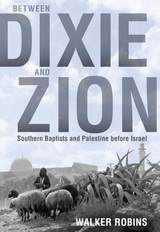
One week after the establishment of the State of Israel in 1948, delegates to the Southern Baptist Convention (SBC) repeatedly and overwhelmingly voted down resolutions congratulating fellow Southern Baptist Harry Truman on his role in Israel’s creation. From today’s perspective, this seems like a shocking result. After all, Christians—particularly the white evangelical Protestants who populate the SBC—are now the largest pro-Israel constituency in the United States. How could conservative evangelicals have been so hesitant in celebrating Israel’s birth in 1948? How did they then come to be so supportive?
Between Dixie and Zion: Southern Baptists and Palestine before Israel addresses these issues by exploring how Southern Baptists engaged what was called the “Palestine question”: whether Jews or Arabs would, or should, control the Holy Land after World War I. Walker Robins argues that, in the decades leading up to the creation of Israel, most Southern Baptists did not directly engage the Palestine question politically. Rather, they engaged it indirectly through a variety of encounters with the land, the peoples, and the politics of Palestine. Among the instrumental figures featured by Robins are tourists, foreign missionaries, Arab pastors, converts from Judaism, biblical interpreters, fundamentalist rebels, editorialists, and, of course, even a president. While all revered Palestine as the Holy Land, each approached and encountered the region according to their own priorities.
Nevertheless, Robins shows that Baptists consistently looked at the region through an Orientalist framework, broadly associating the Zionist movement with Western civilization, modernity, and progress over and against the Arabs, whom they viewed as uncivilized, premodern, and backward. He argues that such impressions were not idle—they suggested that the Zionists were bringing to fruition Baptists’ long-expressed hopes that Israel would regain the prosperity it had held in the biblical era, the Holy Land would one day be revived, and biblical prophecies preceding the return of Christ would be fulfilled.

rate, rising from fifty thousand at the outbreak of revolution to more than a million as the nation
edged toward civil war. As the Second Great Awakening swept through the Old Southwest, it generated
religious enthusiasm among Methodist and Baptist converts who were intent upon replacing
old forms of Protestantism with an evangelical vibrancy that reflected and often contributed
to the unsettled social relations of the new republic. No place was better suited to embrace this
enthusiasm than Kentucky. In Born of Water and Spirit, Richard C. Traylor explores the successes
and failures of Baptists in this area, using it as a window into the elements of Baptist life
that transcended locale.
Traylor argues that the achievements of Baptists in Kentucky reflect, in many ways, their success
and coming of age in the early national period of America. The factionalism that characterized
frontier Baptists, he asserts, is an essential key to understanding who the colonial Baptists had
been, who they were becoming in the late eighteenth through the mid-nineteenth centuries, and
who they would become after the Civil War.
In this highly nuanced study, Traylor looks at the denomination in light of what he calls its
“Baptist impulse”—the movement’s fluid structure and democratic spirit. These characteristics
have proven to be its greatest strength as well as the source of its most terrible struggles. Yet, confronting
theological clashes, along with the challenges that come with growth, forged the Baptist
identity and shaped its future.
The first three chapters examine the primary elements of the impulse: rituals of conversion,
baptism, and communion; the Baptist preacher; and the significance of the local church to the
sect. Following these chapters are explorations of the reformations and forces of change in the
early to mid-1800s, the role of women and African Americans in developing the group, and the
refinement and reorientation of priorities from 1840 to 1860. This important denominational history
will be of great value to scholars of American religious history and the history of the early
American republic.
Richard C. Traylor is a professor of history at Hardin-Simmons University in
Abilene, Texas. His articles have been published in Baptist History and Heritage and
Missouri Historical Review.
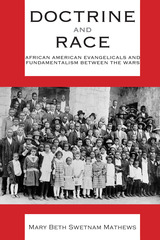
By presenting African American Protestantism in the context of white Protestant fundamentalism, Doctrine and Race: African American Evangelicals and Fundamentalism between the Wars demonstrates that African American Protestants were acutely aware of the manner in which white Christianity operated and how they could use that knowledge to justify social change. Mary Beth Swetnam Mathews’s study scrutinizes how white fundamentalists wrote blacks out of their definition of fundamentalism and how blacks constructed a definition of Christianity that had, at its core, an intrinsic belief in racial equality. In doing so, this volume challenges the prevailing scholarly argument that fundamentalism was either a doctrinal debate or an antimodernist force. Instead, it was a constantly shifting set of priorities for different groups at different times.
A number of African American theologians and clergy identified with many of the doctrinal tenets of the fundamentalism of their white counterparts, but African Americans were excluded from full fellowship with the fundamentalists because of their race. Moreover, these scholars and pastors did not limit themselves to traditional evangelical doctrine but embraced progressive theological concepts, such as the Social Gospel, to help them achieve racial equality. Nonetheless, they identified other forward-looking theological views, such as modernism, as threats to “true” Christianity.
Mathews demonstrates that, although traditional portraits of “the black church” have provided the illusion of a singular unified organization, black evangelical leaders debated passionately among themselves as they sought to preserve select aspects of the culture around them while rejecting others. The picture that emerges from this research creates a richer, more profound understanding of African American denominations as they struggled to contend with a white American society that saw them as inferior.
Doctrine and Race melds American religious history and race studies in innovative and compelling ways, highlighting the remarkable and rich complexity that attended to the development of African American Protestant movements.
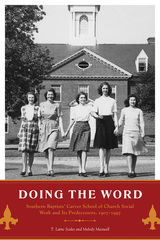
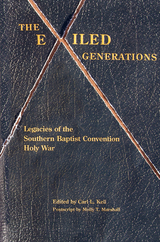
Until now, the stories of this “lost generation” have never been fully told. In this collection, Professor Kell presents a diverse and wide range of voices. Some are well-known Baptist leaders, while others are ordinary people caught up in the remarkable changes in Baptist life over the past few decades. Here, they recount their feelings of loss as they were severed from youth fellowships and removed from church rolls. Many describe the lingering emotional effects of the heartbreaking conflict that dominated their childhood and adolescence. Their recollections reveal the full range of responses—anger, sadness, pathos, humor, intense inner reflection—to these enormous shifts. This volume shows the extent to which this group has struggled and wandered in emotional and religious exile.
The Exiled Generations comprises rich primary sources for scholars and students who are exploring the profound strife that has rocked the Southern Baptist Convention. These deeply moving accounts will offer invaluable assistance to researchers analyzing the impact of the seismic changes within the denomination over the past thirty-five years.
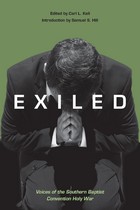
tactics to gain top positions and then used their power to purge Baptist seminary presidents and professors, church pastors, lay leaders, and women from positions of responsibility. America's largest Christian, non-Catholic denomination is firmly locked in a “holy war” to secure its churches and membership for a never-ending struggle against a liberal culture.
Exiled: Voices of the Southern Baptist Convention Holy War is a compilation of first-person narratives by conservative and moderate ministers and lay leaders who were stripped of their positions and essentially became pariahs in the churches to which they had devoted their lives.
While other books have described the takeover in historical, political, and theological terms, Exiled is different. Individual people tell their personal stories, revealing the struggle and heartache that resulted from being vilified, dispossessed, and exiled. Kell includes a variety of perspectives-from lay preachers and church members to prominent former SBC leaders such as James Dunn and Carolyn Crumpler.
The emotion captured on the pages-sadness, shock, disbelief, resignation,
and anger-will make Exiled moving even to readers who know little about the Southern Baptist movement. Exiled will also be of particular interest to historians, sociologists, philosophers of religion, and rhetorical historians.
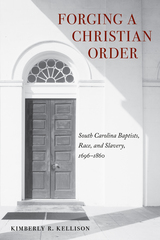
this model evolved from a Christian practice of slavery to one that expounded on slavery as morally right.
Elites who began the Baptist church in late-1600s Charleston closely valued hierarchy. It is not surprising, then, that from its formation the church advanced a Christian model of slavery. The American Revolution spurred the associational growth of the denomination, reinforcing the rigid order of the authoritative master and subservient enslaved person, given that the theme of liberty for all threatened slaveholders’ way of life. In lowcountry South Carolina in the 1790s, where a White minority population lived in constant anxiety over control of the bodies of enslaved men and women, news of revolt in St. Domingue (Haiti) led to heightened fears of Black violence. Fearful of being associated with antislavery evangelicals and, in turn, of being labeled as an enemy of the planter and urban elite, White ministers orchestrated a major transformation in the Baptist construction of paternalism.
Forging a Christian Order provides a comprehensive examination of the Baptist movement in South Carolina from its founding to the eve of the Civil War and reveals that the growth of the Baptist church in South Carolina paralleled the growth and institutionalization of the American system of slavery—accommodating rather than challenging the prevailing social order of the economically stratified Lowcountry.
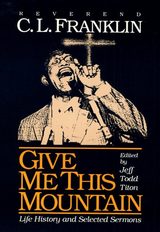
Few black preachers have been better known that the Reverend C. L. Franklin; none has been considered a better preacher. This collection of twenty of Franklin's best sermons shows the development of his style. A learned man, Franklin had attended both seminary and college, yet in his sermons used the old-fashioned, extemporaneous style of preaching, "whooping" or chanting, combining oratory and intoned poetry to reach both head and heart.
Dozens of Franklin's sermons were released on record albums, and he went on preaching tours with gospel groups that included his daughter, Aretha Franklin, reaching virtually every corner of the United States.
This volume begins with Franklin's life history, told in his own words.
In an afterword, Jeff Titon reviews the African-American sermon tradition
and Franklin's place in it.
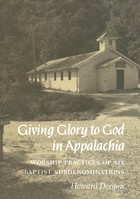
As Dorgan states in the introduction, he is less concerned with academic theorizing and more concerned with presenting a vivid, first-hand account of all that he has seen and heard. And in the nearly fifteen years he spent researching his book, Dorgan saw quite a lot: spirited, vociferous sermons, creek baptisms, foot washings, home comings, dinners on the ground, and evangelistic radio broadcasts. Dorgan's prose is at its most enchaining when he presents tableaus of these phenomena: a foot washing precipitates the erasure of interpersonal turmoil between two women; a preacher uses his lively mode of sermonic delivery to orchestrate the rapturous shouts and "hollers" of a group of women; a radio evangelist exhorts a recent widower to except salvation. The wonderful pictures interspersed throughout the book and the transcription of sermons help to further reify the worship scenes that Dorgan describes.
At times, Dorgan's prose is intensely personal. Dorgan is always aware that he is writing about sets of shared values and worship practices that mean a great deal to the congregations he is studying, and Dorgan treats his subjects and their beliefs with tremendous sensitivity and respect. Ultimately, Dorgan is writing about people and the ways in which they invest their lives with meaning and purpose. This gives Giving Glory to God in Appalachia a universal appeal: even readers who find the religious settings in the book completely alien will be able to sympathize with the congregations' search for meaning.
To sum up: Dorgan has written a beautiful, enthralling book. Don't think--just buy. And while you're at it, you might want to consider Airwaves Of Zion: Radio Religion In Appalachia
(ISBN-10: 0870497979), also by Dorgan.
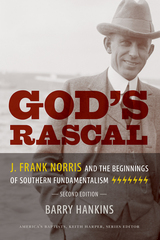
Loathed by mainstream Southern Baptists, J. Frank Norris (1877–1952) was in many ways the Southern Baptist Convention’s first fundamentalist. Twenty-five years after its first publication, this second edition of Barry Hankins’s field-defining work God’s Rascal: J. Frank Norris and the Beginnings of Southern Fundamentalism engages new scholar- ship on American fundamentalism to reassess one of the most controversial figures in the history of American Christianity. In this completely revised edition, Hankins pens an entirely new chapter on J. Frank Norris’s murder trial, examines newly uncovered details regarding his recurrent sexual improprieties, and reconsiders his views on race in order to place J. Frank Norris, a man both despicable and captivating, among the most significant Southern fundamentalists of the twentieth century.
Norris merged a southern populist tradition with militant fundamentalism, carving out a distinctly take-no-prisoners political niche within the Baptist church that often offended his allies as much as his enemies. Indeed, Norris was about as bad as a fundamentalist could be. He resided in a world of swirling conspiracies of leftists who, he argued, intended to subvert both evangelical religion and American culture. There are times when Norris’s ego looms so large in his story that he seemed less interested in the threat these alleged conspiracies posed than in their power to keep him in the limelight. Finally, his tactics foreshadowed those employed in the fundamentalists’ tenacious takeover of the Southern Baptist Convention that would occur more than twenty years after Norris’s death.

Sizemore began writing these essays with the aim of exploring and understanding what happened when the mythology of his “tribe” crumbled from beneath his feet. He draws heavily on his upbringing and his family history as a framework for how his “tribe” of white evangelicals have found ways to reconcile Christianity with what the author finds to be troubling stances on many social issues, among them race, gender, sexuality, materialism, anti-intellectualism, and white supremacy.
In a clear-eyed and eloquent voice, Sizemore grapples movingly with his own bewilderment and chagrin as he struggles to reconcile the essential philosophical and moral decay that he believes many evangelicals have come to embrace. His insights, arranged topically and thematically and told through graceful and accessible prose, toggle between memoir and literary journalism, along a spectrum that touches on history, philosophy, theology, and personal reflections.
.
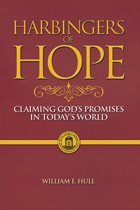
The journey to which this book beckons has five stages. At the outset we meet a restless God of surprises who is never satisfied with things as they are. This encounter discloses the necessity of making transforming changes in our lives if we are to keep pace with the divine dynamic. Our reorientation toward an attitude of expectancy is not an end itself but provides the impetus for a lifelong process of growth toward maturity. Because this quest takes place in a world resistant to changes that challenge the status quo, there will be opposition, setbacks, even defeats that God endures with us as the cost of building a new tomorrow. In that struggle our task is not to flee or to fight but to bear a winsome witness in the confidence that God’s purposes will finally prevail over the human predicament.
Just as the crowing cock is a harbinger of dawn and the robin on the lawn is a harbinger of spring, these 27 messages become harbingers of a steadfast hope, as they help us to anticipate the new future that God is seeking to create for his weary world and as they invite us to actualize that future in the here and now.
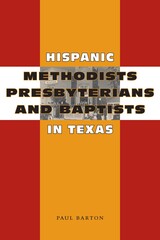
The question of how one can be both Hispanic and Protestant has perplexed Mexican Americans in Texas ever since Anglo-American Protestants began converting their Mexican Catholic neighbors early in the nineteenth century. Mexican-American Protestants have faced the double challenge of being a religious minority within the larger Mexican-American community and a cultural minority within their Protestant denominations. As they have negotiated and sought to reconcile these two worlds over nearly two centuries, los Protestantes have melded Anglo-American Protestantism with Mexican-American culture to create a truly indigenous, authentic, and empowering faith tradition in the Mexican-American community.
This book presents the first comparative history of Hispanic Methodists, Presbyterians, and Baptists in Texas. Covering a broad sweep from the 1830s to the 1990s, Paul Barton examines how Mexican-American Protestant identities have formed and evolved as los Protestantes interacted with their two very different communities in the barrio and in the Protestant church. He looks at historical trends and events that affected Mexican-American Protestant identity at different periods and discusses why and how shifts in los Protestantes' sense of identity occurred. His research highlights the fact that while Protestantism has traditionally served to assimilate Mexican Americans into the dominant U.S. society, it has also been transformed into a vehicle for expressing and transmitting Hispanic culture and heritage by its Mexican-American adherents.
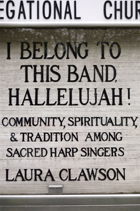
The Sacred Harp choral singing tradition originated in the American South in the mid-nineteenth century, spread widely across the country, and continues to thrive today. Sacred Harp isn’t performed but participated in, ideally in large gatherings where, as the a cappella singers face each other around a hollow square, the massed voices take on a moving and almost physical power. I Belong to This Band, Hallelujah! is a vivid portrait of several Sacred Harp groups and an insightful exploration of how they manage to maintain a sense of community despite their members’ often profound differences.
Laura Clawson’s research took her to Alabama and Georgia, to Chicago and Minneapolis, and to Hollywood for a Sacred Harp performance at the Academy Awards, a potent symbol of the conflicting forces at play in the twenty-first-century incarnation of this old genre. Clawson finds that in order for Sacred Harp singers to maintain the bond forged by their love of music, they must grapple with a host of difficult issues, including how to maintain the authenticity of their tradition and how to carefully negotiate the tensions created by their disparate cultural, religious, and political beliefs.

Stone served in Africa with his wife and successfully learned the Yoruba language. He was an intelligent, self-reflective, and reliable observer, making his works important sources of information on Yoruba society before the intervention of European colonialism. In Africa's Forest and Jungle is a rare account of West African culture, made all the more complete by the additional journal entries, letters, and photographs collected in this edition.
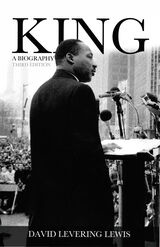
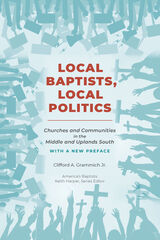
This provocative book explores the political views and actions of religious adherents who claim to base their faith on a literal interpretation of the Bible. Focusing on several small Baptist sects scattered throughout the middle and uplands South, Clifford Grammich finds that these groups are often highly engaged politically at the local level. He thus challenges the traditional view of these Baptists as politically aloof, concerned only with matters of faith and personal conduct.
Grammich shows that the politics arising from these groups’ religious beliefs are not those of any consistent, pervasive ideology. Rather, he argues, such politics more often reflect a series of adaptations to local circumstances. Among the sects that he studies, there is a strong emphasis on the local authority to interpet the Bible and, thus, to shape religious commands to very specific conditions. Beyond the broad concerns of preserving the traditional family and curbing excessive worldliness, these Baptists are free to adapt their theology to meet their particular needs—and can often do so more readily than those belonging to more hierarchical churches. Since these people are typically more rural, more southern, less educated, and less affluent than most Americans, the author notes, they can face special problems in dealing with modernity—problems that their religion helps them address.
The book includes two case studies that show in depth both the possiblities and limitations of politics within these groups. In a local labor struggle in Tennessee, Baptist sectarians were able to generate more religious support for a United Mine Workers local than was offered by the usual supporters of organized labor in other churches. On the other hand, in an environmental conflict in Kentucky, these Baptists’ traditional community concerns inhibited their participation in a broader reform movement.
Relating the beliefs and actions of the “local Baptists” to various larger themes—including those of cultural traditionalism, economic populism, and increasing affluence—Grammich offers a valuable study of the complex ways in which religious faith can affect political involvement. His book will effect a new understanding of American fundamentalism itself.
The Author: Clifford A. Grammich Jr. is director of research at Heartland Center, a social research institute in Hammond, Indiana.
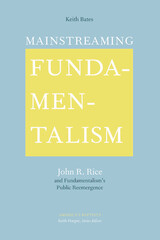
In Mainstreaming Fundamentalism: John R. Rice and Fundamentalism’s Public Reemergence, Keith Bates embarks on a thematic and chronological exploration of twentieth-century Baptist fundamentalism in postwar America, sharing the story of a man whose career intersected with many other leading fundamentalists of the twentieth century, such as J. Frank Norris, Bob Jones Sr., Bob Jones Jr., and Jerry Falwell.
Unique among histories of American fundamentalism, this book explores the theme of Southern fundamentalism’s reemergence through a biographical lens. John R. Rice’s mission to inspire a broad cultural activism within fundamentalism—particularly by opposing those who fostered an isolationist climate—would give direction and impetus to the movement for the rest of the twentieth century. To support this claim, Bates presents chapters on Rice’s background and education, personal and ecclesiastical separatism, and fundamentalism and political action, tracing his rise to leadership during a critical phase of fundamentalism’s development until his death in 1980.
Bates draws heavily upon primary source texts that include writings from Rice’s fundamentalist contemporaries, his own The Sword of the Lord articles, and his private papers—particularly correspondence with many nationally known preachers, local pastors, and laypeople over more than fifty years of Rice’s ministry. The incorporation of these writings, combined with Bates’s own conversations with Rice’s family, facilitate a deeply detailed, engaging examination that fills a significant gap in fundamentalist history studies.
Mainstreaming Fundamentalism: John R. Rice and Fundamentalism’s Public Reemergence provides a nuanced and insightful study that will serve as a helpful resource to scholars and students of postwar American fundamentalism, Southern fundamentalism, and Rice’s contemporaries.
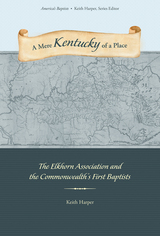
As the story goes, an itinerant preacher once visited the Bluegrass region and proclaimed heaven to be “a mere Kentucky of a place.” The Commonwealth’s first Baptists certainly thought so as they began settling the region a decade before statehood. By 1785 a group of pioneering preachers formed the Elkhorn Association, widely regarded as the oldest Baptist association west of the Alleghenies. Often portrayed in the historiography as the vanguard of a new frontier democracy, the Elkhorn Association, on closer inspection, reveals itself to be far more complex. In A Mere Kentucky of a Place, Keith Harper argues that the association’s Baptist ministers were neither full-fledged frontier egalitarians nor radical religionists but simply a people in transition. These ministers formed their identities in the crucible of the early national period, challenged by competing impulses, including their religious convictions, Jeffersonian Republicanism, and a rigid honor code—with mixed results.
With a keen eye for human interest, Harper brings familiar historical figures such as John Gano and Elijah Craig to life as he analyzes leadership in the Elkhorn Association during the early republic. Mining the wealth of documents left by the association, Harper details the self-aware struggle of these leaders to achieve economic wealth, status, and full social and cultural acceptance, demonstrating that the Elkhorn Association holds a unique place in the story of Baptists in the “New Eden” of Kentucky.
Ideal for course adoption in religious studies and students of Kentucky history, this readable work is sure to become a standard source on the history of religion on the Kentucky frontier.
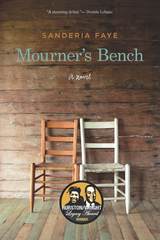
But first, Sarah would need to navigate the growing tensions of small-town Arkansas in the 1960s. Both smarter and more serious than her years (a “fifty-year-old mind in an eight-year-old body,” according to Esther), Sarah was torn between the traditions, religion, and work ethic of her community and the progressive civil rights and feminist politics of her mother, who had recently returned from art school in Chicago. When organizers from the Student Non-Violent Coordinating Committee (SNCC) came to town just as the revival was beginning, Sarah couldn’t help but be caught up in the turmoil. Most folks just wanted to keep the peace, and Reverend Jefferson called the SNCC organizers “the evil among us.” But her mother, along with local civil rights activist Carrie Dilworth, the SNCC organizers, Daisy Bates, attorney John Walker, and indeed most of the country, seemed determined to push Maeby toward integration.
With characters as vibrant and evocative as their setting, Mourner’s Bench is the story of a young girl coming to terms with religion, racism, and feminism while also navigating the terrain of early adolescence and trying to settle into her place in her family and community.
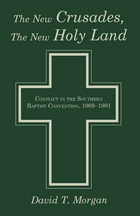
Examines the conflict between modern-day Southern Baptists and “liberal” Southern Baptists over control of the Southern Baptist Convention
David Morgan captures the essence of the conflict between some modern-day Southern Baptists, who saw themselves as crusaders for truth, as they sought to redeem a new holy land--the Southern Baptist Convention-- from the control of other Southern Baptists they viewed as "liberals." To the so-called liberals, the crusaders were "fundamentalists" on a mission, not to reclaim the SBC in the name of theological truth but to gain control and redirect its activities according to their narrow political, social, and theological perspectives. The New Crusades provides a comprehensive history of the conflict, taking the reader through the bitter and divisive struggles of the late 1980s, that culminated in the 1991 emergence of a moderate faction within the SBC. The fundamentalists had won.

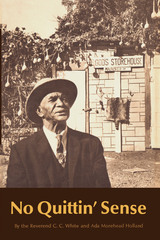
This story, set in the Piney Woods country of East Texas, spans most of a century, from shortly after the close of the Civil War to the 1960's. It is the story of Charley White, who was born in the middle of those woods—in a decaying windowless log cabin a few years after his mother and father were freed from slavery. His childhood, lived in almost unbelievable poverty, was followed by financial stability achieved in middle age through years of struggle. And then, in order to obey God's will, he abandoned this secure life, and for forty years he waged a one-man war on poverty and intolerance.
Winner of the Carr P. Collins Award (best nonfiction book) of the Texas Institute of Letters, No Quittin' Sense presents the story of Rev. C. C. "Charley" White, whose life has inspired thousands of readers since the book was first published in 1969.
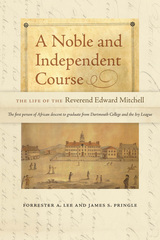
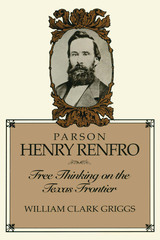
The years following the Texas Revolution held even more turbulent events as diverse droves of pioneers crossed the Sabine and Red Rivers to start new lives in Texas. Early Texas society contended with religious issues, family life in a rugged environment, and the Civil War. This cultural history was clearly reflected in the life of frontier preacher Henry C. Renfro.
Migrating to Texas in 1851, Renfro enrolled in the fledgling Baylor University and became a Baptist preacher. Eventually disillusioned with Baptist orthodoxy, Renfro was disenfranchised on charges of infidelity as he embraced the ideals of the Free Thought Movement, inspired by the writings of men such as Thomas Paine, Spinoza, and Robert Ingersoll.
Renfro's Civil War experience was no less unusual. Serving as both soldier and chaplain, Renfro left a valuable legacy of insight into the conflict, captured in a wealth of correspondence that is in itself significant.
Drawing on a vast body of letters, speeches, sermons, and oral histories that had never before been available, this chronological narrative of "The Parson's" life describes significant changes in Texas from 1850 to 1900, especially the volatile formation and growth of Baptist churches in North Central Texas. William Griggs' study yields numerous new details about the Free Thought Movement and depicts public reaction to sectarian leaders in nineteenth-century Texas.
The author also describes the developing Central Texas region known as the Cross Timbers, including the personal dynamics between a frontier family and its patriarch and encompassing such issues as property conflicts, divorce, and family reconciliation. This work unlocks an enlightening, engaging scene from Texas history.
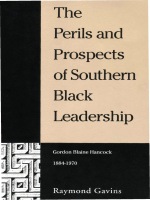
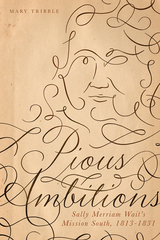
In 1812 at the age of nineteen, Sally Merriam Wait experienced her conversion. For those raised in an evangelical church during the religious fervor of the Second Great Awakening, conversion represented a key moment in a young person’s life, marking the transition from childhood and frivolity to the duties of a pious life. Sally’s conversion also marked the beginning of her journal.
Wait grew up in a New England swept with revival. Her letters reveal a northernborn woman with anti-slavery leanings engaging with an unfamiliar environment in the slave-holding South; she comes to embrace the principles of a market economy in Jacksonian America, while attending to her developing religious faith. Her decisions are shaped by a surging evangelical movement, changes in the American economy, the rise of women’s social agency, a fracturing of political traditions, and the moral conflicts inherent in a slave economy. At its simplest, Sally’s life is the tale of a nineteenth-century woman endeavoring to make her mark on the world while striving to develop her faith.
Pious Ambitions establishes Sally Merriam Wait as a significant figure in North Carolina and Baptist history. Her ambition led her from young convert to devoted wife of Reverend Samuel Wait, the first president and founder of Wake Forest University. Her journal was passed down carefully from generation to generation until it found its way in 1993 to the Special Collections and Archives at Z. Smith Reynolds Library at Wake Forest University in Winston-Salem, North Carolina, along with a large cache of letters and other documents. In examining this trove and reconstructing the life of Wait, Mary Tribble provides a rare glimpse into the spiritual education of a young woman who nevertheless successfully navigated the rise of capitalism in the market economy of the early nineteenth century.
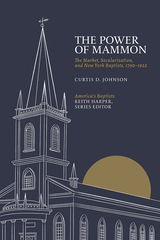
In The Power of Mammon, Curtis D. Johnson describes how the market economy and market-related forces, such as the media, politics, individualism, and consumerism, radically changed the nature of Baptist congregational life in New York State during three centuries. Collectively, these forces emphasized the importance of material wealth over everything else, and these values penetrated the thinking of Baptist ministers and laypeople alike. Beginning in the 1820s, the pastorate turned into a profession, the laity’s influence diminished, closeknit religious fellowships evolved into voluntary associations, and evangelism became far less effective. Men, being the most engaged in the market, secularized the more quickly and became less involved in church affairs. By the 1870s, male disengagement opened the door to increased female participation in church governance. While scientific advances and religious pluralism also played a role, the market and its related distractions were the primary forces behind the secularization of Baptist life.
The Power of Mammon is history from the ground up. Unlike many denominational histories, this book emphasizes congregational life and the importance of the laity. This focus allows the reader to hear the voices of ordinary Baptists who argued over a host of issues. Johnson deftly connects large social trends with exhaustive attention to archival material, including numerous well-chosen records preserved by forty-two New York churches. These records include details related to membership, discipline, finance, and institutional history. Utilizing statistical analysis to achieve even greater clarity, Johnson effectively bridges the gap between the particularity of church records and the broader history of New York’s Baptist churches.
Johnson’s narrative of Baptist history in New York will serve as a model for other regional studies and adds to our understanding of secularization and its impact on American religion.
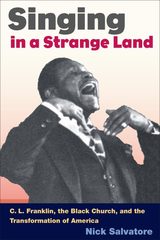
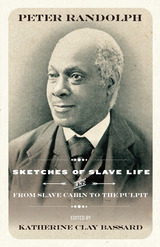
This book is the first anthology of the autobiographical writings of Peter Randolph, a prominent nineteenth-century former slave who became a black abolitionist, pastor, and community leader.
Randolph’s story is unique because he was freed and relocated from Virginia to Boston, along with his entire plantation cohort. A lawsuit launched by Randolph against his former master’s estate left legal documents that corroborate his autobiographies.
Randolph's writings give us a window into a different experience of slavery and freedom than other narratives currently available and will be of interest to students and scholars of African American literature, history, and religious studies, as well as those with an interest in Virginia history and mid-Atlantic slavery.
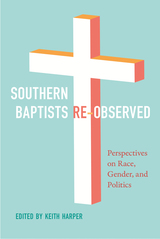
The sweeping success of the conservative takeover—based on enforcing doctrinal fidelity, especially on issues like biblical inerrancy and so-called complementarianism, a rejection of modern, secular values, and advanced international missionary work—veiled a weakness at its very heart. By the turn of the twenty-first century, the conservative resurgence failed to attract new members and, even worse, the younger generation who had grown up in the SBC were fleeing the denomination—nearly half of them are leaving the church as adults and never coming back. The contributors to this volume all offer insights into the question of why. While conservatives dominate the SBC’s governance, they have failed to resolve issues that preoccupy its members and the larger society, including those related to gender, homosexuality, race, and abuse.
The essays are grouped under four broad categories: Truth and Freedom: Baptist Institutions and Contentious Issues; Defining and Defending Biblical Truth: Staking the Boundaries; Apologies, Reconciliation, and Continuing Reality; and the View from Outside. With an introduction by editor Keith Harper contextualizing the history of the movement and the issues it faces today, this collection is sure to add new insight into this influential denomination.


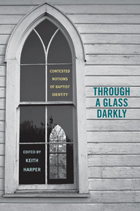
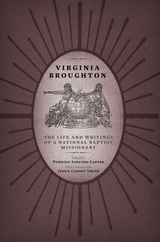
For more than half a century, Virginia E. Walker Broughton (1856–1934) worked tirelessly to uplift black communities, and especially black women, throughout Tennessee. Born into an elite African American family in Nashville, she began her professional career as a teacher and later became one of the most prominent domestic missionaries in the National Baptist Convention, U.S.A., as well as an accomplished speaker and writer. This annotated collection is the first scholarly work devoted entirely to Broughton’s life and writings.
The book for which Broughton is best known, Twenty Year’s [sic] Experience of a Missionary, was an autobiography first published in 1907 and reprinted in 1988 as part of a scholarly edition of spiritual narratives by black women. Recently, in the archives of Fisk University, Broughton’s alma mater, Tomeiko Ashford Carter discovered an earlier autobiographical work, A Brief Sketch of the Life and Labors of Mrs. V. W. Broughton, Bible Band Missionary, for Middle and West Tennessee, which was distributed at the famous Atlanta Cotton States and International Exposition of 1895. While both autobiographies portray Broughton as an important religious figure for whom missionary work became a saving grace, Life and Labors is more revealing of key facts about Broughton and her family, and it situates them more clearly among the nation’s black elite. This volume not only brings Life and Labors back into print but also collects various other pieces Broughton produced during her long career.
Among those other writings is a 1904 booklet titled Woman’s Work: As Gleaned from the Women of the Bible, and the Bible Women of Modern Times, which recognizes the prominence of the female in Christian theology and shows how Broughton anticipated the work of present-day feminist and womanist theologians. Several “training course” articles that Broughton wrote for a National Baptist newspaper, covering such topics as the Christian deportment of women and the need for black spiritual literature, are also gathered here, as are a program she devised for systematic Bible study and a brief article, published just a few years before her death, in which she describes some of her missionary field work. Complementing these primary materials are an extensive critical introduction and notes by Carter, a Walker-Broughton family tree, and a chronology of Broughton’s life.
As this collection makes clear, Virginia Broughton was strongly committed to making the work of black religious women an ongoing intellectual enterprise. In these pages, she emerges as both a dedicated missionary and a formidable religious scholar.
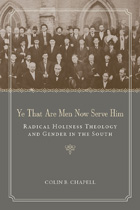
Modernity remade much of the world in the late nineteenth and early twentieth centuries and was nowhere more transformational than in the American South. In the wake of the Civil War, the region not only formed new legal, financial, and social structures, but citizens of the South also faced disorienting uncertainty about personal identity and even gender itself. Ye That Are Men Now Serve Him traces the changes in southern gender roles during the New South period of 1877–1915 and demonstrates that religion is the key to perceiving how constructions of gender changed.
The Civil War cleaved southerners from the culture they had developed organically during antebellum decades, raising questions that went to the very heart of selfhood: What does it mean to be a man? How does a good woman behave? Unmoored from traditional anchors of gender, family, and race, southerners sought guidance from familiar sources: scripture and their churches. In Ye That Are Men Now Serve Him, Colin Chapell traces how concepts of gender evolved within the majority Baptist and Methodist denominations as compared to the more fluid and innovative Holiness movement.
Grounded in expansive research into the archives of the Southern Baptist Convention; Methodist Episcopal Church, South; and the Holiness movement, Chapell’s writing is also enlivened by a rich trove of primary sources: diaries, sermons, personal correspondence, published works, and unpublished memoirs. Chapell artfully contrasts the majority Baptist and Methodist view of gender with the relatively radical approaches of the emerging Holiness movement, thereby bringing into focus how subtle differences in belief gave rise to significantly different ideas of gender roles.
Scholars have explored class, race, and politics as factors that contributed to contemporary southern identity, and Chapell restores theology to its intuitive place at the center of southern identity. Probing and illuminating, Ye That Are Men Now Serve Him offers much of interest to scholars and readers of the South, southern history, and religion.
READERS
Browse our collection.
PUBLISHERS
See BiblioVault's publisher services.
STUDENT SERVICES
Files for college accessibility offices.
UChicago Accessibility Resources
home | accessibility | search | about | contact us
BiblioVault ® 2001 - 2024
The University of Chicago Press









